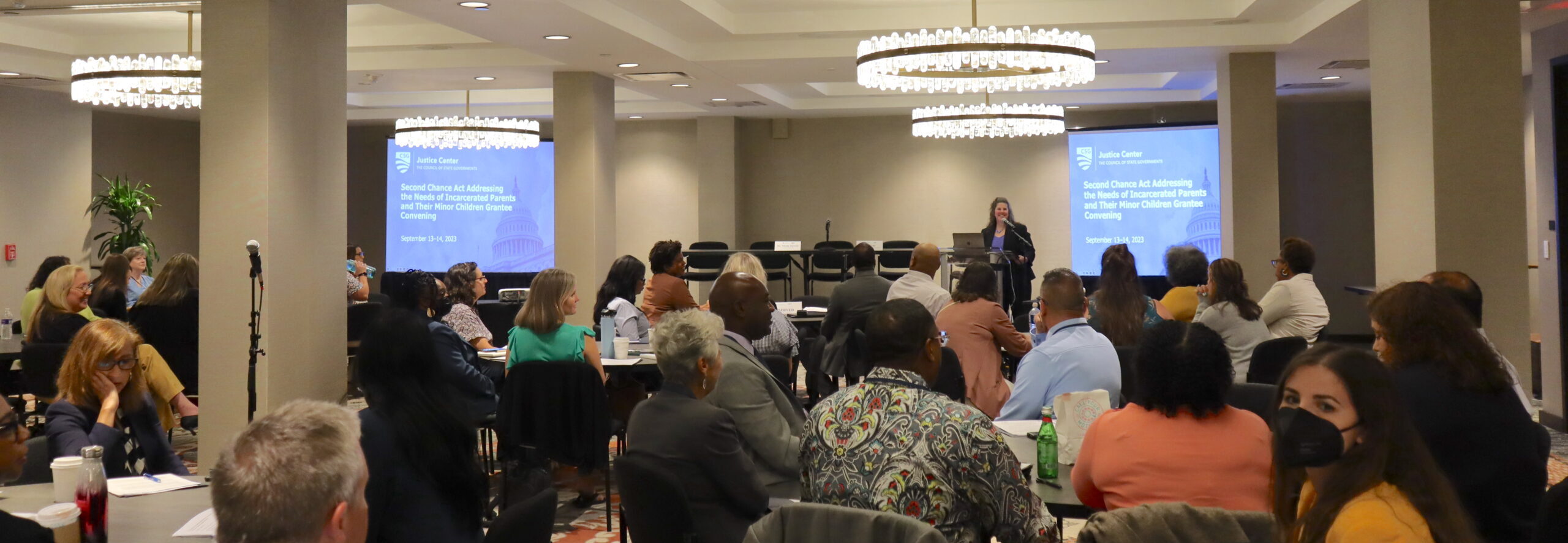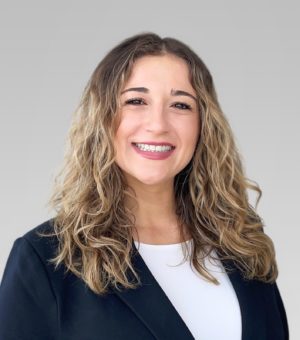
Nearly half of people incarcerated in state and federal prisons are parents with minor children, signaling a need for robust and responsive reentry programming that supports families and caregivers through both incarceration and reintegration. To discuss these needs and strategies, the U.S. Department of Justice’s Office of Juvenile Justice and Delinquency Prevention (OJJDP) and The Council of State Governments (CSG) Justice Center hosted the first-ever, multi-day convening of Second Chance Act Addressing the Needs of Incarcerated Parents and Their Minor Children grantees to discuss best practices and emerging issues in reentry programming for parents and families. The event brought together state and local criminal justice leaders and service providers representing 27 grantee projects across 21 states.
The training and peer learning event kicked off with opening remarks from OJJDP Administrator Liz Ryan, who affirmed OJJDP’s commitment to supporting the development and expansion of services that meet the needs of incarcerated parents and strengthen family bonds. Across the two days, full of presentations and discussions covering a diverse range of programming, types of communities, and demographics, five key themes of innovative strategies emerged.
1. Learning from Lived Experience
Judith Clark, the event’s first presenter, was the mother of a young child when she was sentenced to life in prison in 1983. She shared with grantees the challenges and impacts of incarceration that she and her daughter faced for 37 years before Clark was granted parole. She remarked, “Even if a parent is incarcerated, they are still a parent.” While incarcerated, Clark helped create the Children’s Center at Bedford Hills Correctional Facility. Driven by her identity as a mother, she co-developed and led programs, wrote curricula, and worked with women living with their babies in the facility nursery.
Clark’s powerful story affirmed the importance of creating opportunities for incarcerated parents to identify their own needs and challenges and of uplifting them as experts who are best positioned to create programs that address the needs of parents and their children. As such, many programs across the country are developing and utilizing peer and mentorship networks among incarcerated parents or developing advisory councils with people with lived experience to ensure programs are human-centered, well-informed, and efficacious.
2. Reentry and Family Reunification Planning Starts at Day One
Because incarcerated parents can easily feel disconnected from their child’s life, supporting parents in maintaining their commitment to being a parent during incarceration starting from day one is key to preparing families for reentry and family reunification. Practitioners in the field are prioritizing innovative ways to maintain meaningful connection and communication between incarcerated parents and their children, such as
- Identifying parents at entry;
- Addressing the immediate pain of separation; and
- Engaging in collaborative case planning with the incarcerated parent, child, and caregiver.
From there, staff provide ongoing support for sustaining family bonds during incarceration. Exemplary parenting programs provide the opportunity for parents and children to stay in contact through in-person visits as well as supplementary modes of contact such as telecommunication or letter-writing. Programs can also provide ways for incarcerated parents to develop their parental identities and exercise an active parental role, such as through parent-teacher conferences, family bonding time with arts and crafts, or therapy sessions with the child.
Staff can also engage family members in the release planning process, recognizing that having family buy-in is an important part of setting returning parents up for reentry success. This process can help strengthen relationships and family bonds, allowing space for caretakers and family to express their feelings and concerns. This in turn promotes positive transitional planning and ensures that planning responds to the parent and their family’s unique needs. Effective modes of engagement in this process can include conducting assessments or surveys to gather information about their needs and scheduling regular case planning meetings.
3. Leaning on Community
Throughout the convening, attendees discussed the innovative ways that correctional facilities, community partners, and incarcerated individuals are working collaboratively to implement successful and sustainable programming to promote reentry success. This includes developing strategic partnerships with service providers in transitional housing, child welfare, doula programs, and more to help provide comprehensive pre- and post-release plans. Some partnerships can also facilitate prosocial family bonding. One grantee partnered with community businesses to receive donations so that incarcerated parents could wrap and give gifts to their children for special days like birthdays or holidays. Presenters also highlighted the use of technology to improve communication and contact between incarcerated parents and children through tele-visits. Leveraging internal communication systems eliminates the financial barrier and increases parent-child interactions. Other innovative programs that involved community stakeholders included trauma-informed yoga, art therapy, a bike donation program for those with transportation needs, and outdoor adventure programs for youth. Such programs allow positive outlets for both parents and children to strengthen their relationships and familial identities and to create joyful memories.
4. Data and Documentation
While data collection and analysis can feel onerous or intimidating for program administrators, the success and longevity of programs often depend on regular evaluations and ongoing performance measurement, especially during the implementation stage of a new program. Kevin Warwick, president of Alternative Solutions Associates, discussed methods to capture accurate data, clean and interpret data, and share data through storytelling. Effectively demonstrating a program’s impact and success through data can often help secure funding and support, especially during unforeseen changes such as staff or leadership turnover. He emphasized that program administrators should be “collecting data you need, not the data you want.”
5. Caring for Corrections and Program Staff
Correctional officers, counselors, social workers, and other program administrators and staff among the grantees have fostered a culture of change and understanding within facilities and been instrumental in creating programs, child-friendly visit spaces, and effective parenting curricula. However, despite the meaningfulness of this work, burnout and secondary trauma can be common and unintended consequences of the job. Panelists discussed how this work requires addressing the wellbeing of staff. They highlighted examples of how to mitigate those harms, such as providing staff wellness centers, organizing staff appreciation luncheons, and making mental health and wellness resources available for correctional staff to provide outlets to process their work.
With funding from OJJDP, The Council of State Governments Justice Center provides technical assistance to Second Chance Act Addressing the Needs of Incarcerated Parents and Their Minor Children grantees. To read more about the program and grantee highlights, visit our Families page and read the most recent solicitation.
Photo credit: Sarah Kelley, CSG Justice Center
About the author



When returning to their communities from criminal justice settings, people with behavioral health needs face barriers in accessing…
Read MoreNew Hampshire Department of Corrections Commissioner Helen Hanks presents at the Medicaid and Corrections Policy Academy in-person meeting.
Read MoreThe Council of State Governments (CSG) Justice Center has launched the Collaborating for Youth and Public Safety Initiative…
Read More Assigned to the Cloud Crew: The National Incarceration Association’s Hybrid Case Management for People with Behavioral Health Needs
Assigned to the Cloud Crew: The National Incarceration Association’s Hybrid Case Management for People with Behavioral Health Needs
When returning to their communities from criminal justice settings, people with behavioral health needs face barriers in accessing basic needs—including food, housing, employment, transportation, education, clothing, and substance use and mental health services—which increases their risk of experiencing a crisis.
Read More Meet the Medicaid and Corrections Policy Academy Mentor States
Meet the Medicaid and Corrections Policy Academy Mentor States
New Hampshire Department of Corrections Commissioner Helen Hanks presents at the Medicaid and Corrections Policy Academy in-person meeting.
Read More Six States Commit to Improving Statewide Strategies to Address Youth Crime, Violence and Behavioral Health
Six States Commit to Improving Statewide Strategies to Address Youth Crime, Violence and Behavioral Health
The Council of State Governments (CSG) Justice Center has launched the Collaborating for Youth and Public Safety Initiative (CYPSI) in partnership with six states: California, New Mexico, New York, Ohio, Oklahoma, and Rhode Island. The initiative will help states develop, fund, and effectively implement a research-based service continuum to improve public safety and behavioral health, education, and other outcomes for youth.
Read More Bipartisan Group of 88 Lawmakers Push for Continued Funding for Reentry and Recidivism Programs
Bipartisan Group of 88 Lawmakers Push for Continued Funding for Reentry and Recidivism Programs
A bipartisan group of 88 lawmakers, led by Representatives Carol Miller (R-WV) and Danny Davis (D-IL), wrote a letter calling for continued funding for the Second Chance Act in the Fiscal Year 2026 Commerce, Justice, Science, and Related Agencies appropriations bill.
Read More









